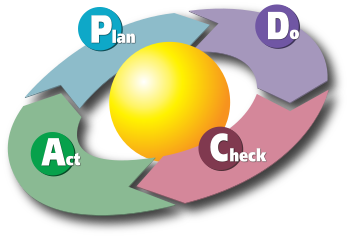 |
| Droste mirror effect - https://commons.wikimedia.org/wiki/File:A_mirror_Droste_effect_20140211181417.jpg |
Recursion: my reflection on her reflection on 'reflective practice'
It is all cyclical. What goes around comes around... like karma. Right thought, right speech, right action. What I read in that journal reminded me of my initial teacher training, which was to consider learning as a four stage process and we should strive to improve and refine the experience, much in the way of agile development. |
| Deming Cycle, image under CC license Wikimedia |
Since this was one of my formative teacher training experiences I have found it to be an ingrained approach, one which I had (wrongly) assumed all teachers did as either a formal inquiry or at least as a thought exercise throughout their teaching practice.
Triadic Coaching
I was also fortunate to be involved in coaching triads which were non-hierarchical (e.g. not with a HoD or line manager so you would not be restricted by insecurities of an appraisal process) and involved teaming up with staff from other departments (even admin) who non-judgmentally observed my lesson with a co-constructed aim and helped facilitate reflective practice by only offering questions rather than comments or judgments, this helped us to question our own assumptions with the benefit of an impartial observer's 'other' perspective. For example, I may have been initially overly self-critical of the success of a lesson by focusing on the negative behaviour of one or two students but the buddy would ask, "how many students were on task at that point?" which would help to direct your reflection to other areas of success, or they may ask, "how did you feel at that point and how could you deal with that differently in the future". This essentially mirrors Gibb's Reflective cycle (Gibbs, 1988) as described in the journal (p8, Finlay, L., 2008)The Dark Side of Reflective Practice is tempting
 |
| "Come to the Dark side - we have cookies" licensed by CC from https://www.flickr.com/photos/zizzy/6900760165 |
I have used my HoD as a sounding board for the solitary reflections I have done in response to student feedback, observation and results data and my suggestions in how to improve the course have largely been agreed upon and actioned. We have brought about systemic change that has gone through multiple iterations of PDSA.
No comments:
Post a Comment